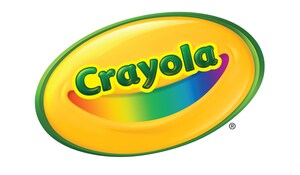40 years after Crayola started collecting children's artwork, the iconic brand opens its archives to spark conversations about the importance of childhood creativity and inspire parents to nurture it at home
Crayola releases new study in partnership with Ad Council Research Institute that identifies barriers among parents to creating creative moments with their kids
EASTON, Pa., April 17, 2024 /PRNewswire/ -- Home to what was one of the largest collections of children's art in the country, Crayola is unlocking its time capsule of creativity and reuniting adults with the artwork they created when they were kids decades ago. The undertaking is part of today's launch of Crayola's Campaign for Creativity which challenges conventional perceptions about creativity, igniting a new dialogue about the value of creativity and helping parents integrate more creative moments into their children's lives.
Timed to launch ahead of the UN World Creativity and Innovation Day—and 40 years after Crayola began collecting children's artwork—Crayola is debuting a captivating series of short films, titled Stay Creative. The films feature the stories of three adults across the country who participated in a Crayola art program as kids. As they are reunited with their childhood artwork, the adults reflect on how creativity impacted their lives, and the importance of nurturing creativity in their own children.
"These films capture just a few of the stories we've encountered that bring to life the enduring value of childhood creativity. They also illustrate the pivotal role parents have in helping their children develop lifelong creative mindsets essential for whatever path they take in life," said Victoria Lozano, EVP Marketing at Crayola. "Through the Campaign for Creativity, Crayola not only hopes to encourage and help facilitate this dialogue, but also assist in providing the right creative resources and inspiration parents need to help all children reach their full potential."
Crayola and Ad Council Research Institute Partner on Creativity Study
To aid in its effort, Crayola partnered with the Ad Council Research Institute to study parents' perceptions about creativity. The research analyzed knowledge, attitudes, and behaviors on creativity and how parents view its importance for their children.
According to the study, 9 in 10 parents say creativity is important for their child, and that encouraging children to use their imagination, explore different possibilities, and express themselves authentically is essential for their development and learning. However, the study also discovered that parents need help overcoming barriers to making creative moments part of their daily routines.
- More than 60% of parents don't think their children get enough creative activity or aren't sure if they do.
- 53% of parents believe they need to be creative themselves to raise creative kids, and an additional 21% are not sure.
- 33% struggle balancing creative moments with too many other things that compete for time throughout the day.
- 29% have difficulty coming up with new creative activities.
"We're pleased to partner with Crayola to help study not only how parents perceive creativity but also to support their efforts to advance awareness of the long-lasting impact creative moments have on children and society," said Derrick Feldmann, managing director, Ad Council Research Institute. "There is a great opportunity to educate and empower them to practice it with their children."
Known for inspiring creativity in children for more than 120 years, Crayola is uniquely positioned to elevate the importance of childhood creativity, which has been shown to help develop core life skills, predict career achievement, boost education attainment and support well-being and fulfillment.
"Our research showed that sparking creative moments at home can make a significant difference in helping children develop creativity as a critical life skill," Lozano said. "We believe the value of shared creative moments between parent and child, of putting imagination into action, is an important conversation to have with parents and one that Crayola can genuinely lead."
Enlisting Help to Return Art
As part of the Stay Creative initiative, Crayola is hoping the public will join in the efforts to reunite 50 additional pieces of artwork with their creators this year. To enlist help from the greater community, Crayola will be releasing artwork images on its social channels with the goal of facilitating more heartfelt reunions and conversations about creativity. This is the first wave of art being returned in what Crayola hopes to be the ultimate return of all 1,000 pieces of art remaining in its archives from what was once one of the largest collections of children's artworks in the world.
Resources and additional information about the Campaign for Creativity are available at crayola.com/CampaignForCreativity.
About Crayola
Whether it's providing tools to put a purple octopus on the moon, helping create family memories or enabling teachers to bring arts-infused learning into the classroom, Crayola is passionate about helping parents and educators raise creatively alive children. The company has inspired creativity in children for 120 years, creating a broad portfolio of products, experiences and content that encourage kids to explore, discover, play, pretend, and dream. The Crayola brand has grown into an expansive portfolio of innovative art tools and learning resources, crafting activities, toys and digital platforms, live action and animation and including location-based experiences allowing children of all ages to color their world in imaginative ways. Through its work, Crayola sees a world where the inherent creativity of children is fully nurtured into adulthood, filling the world with more curiosity, imagination, joy, connections, and meaningful lives. For more information visit www.Crayola.com or join the conversation at www.Facebook.com/Crayola.
SOURCE Crayola
WANT YOUR COMPANY'S NEWS FEATURED ON PRNEWSWIRE.COM?
Newsrooms &
Influencers
Digital Media
Outlets
Journalists
Opted In





Share this article